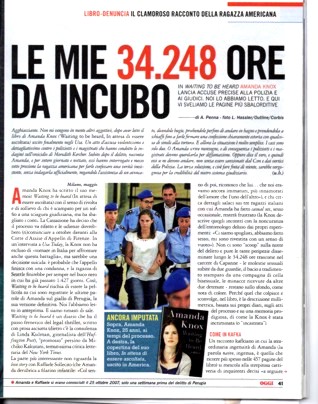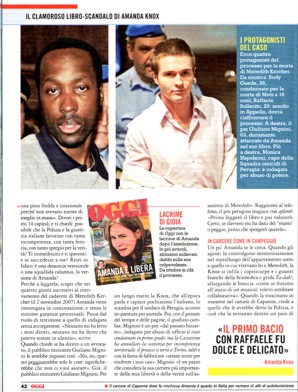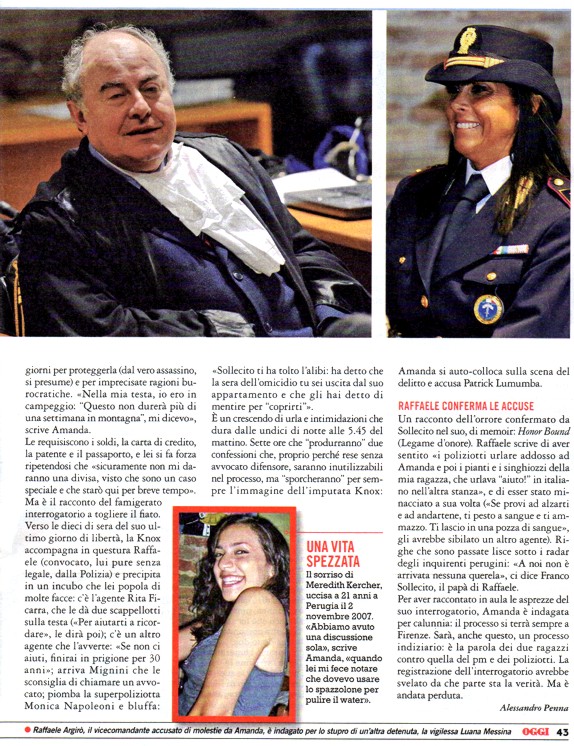
Sunday, May 12, 2013
Demonizations By Knox: OGGI Charged For Article Conveying False Claims To Italy #1
Posted by Our Main Posters

The popular Italian magazine Oggi was sent a review copy of Knox’s book by somebody in the United States.
Oggi has been a frequent vehicle for the Knox entourage version of events, and it has carried a number of lurid pro-Knox splashes. The magazine has a long history of nasty jabs at prosecution and police who as career civil servants under unusually strong rules have no easy ways of explaining their side.
Like all of Oggi’s articles on the case, this shrill and foolish piece is totally one-sided and absolutely unresearched.
- Oggi is ignorant of the fact that many days of testimony by police officers at trial in 2009 contradict Knox’s book, highly convincing testimony, to which Knox on the stand had only the most feeble and unconvincing of responses.
- Oggi is ignorant of the fact that Judge Massei and even Judge Hellmann disbelieved her, and (in extensive reasoning) the Supreme Court (make sure to read parts 3, 7 and 15 there).
- Oggi is ignorant of the fact that Knox was sentenced to three years in prison for the criminal framing of Patrick, and that sentence was confirmed both by Judge Hellmann and the Supreme Court - in effect, unless new FACTS come to light, the truth is known and the case is closed.
The book is already (see next post) the subject of a lawsuit which was filed Friday in Bergamo, where Oggi has its headquarters. Knox is also expected to be investigated for contempt of court. Her book carries at least one no-contest false accusation of a crime: Knox claims the much respected Prosecutor Mignini illegally interrogated her without a lawyer and attempted to make her definitively accuse Patrick Lumumba. This is repeated below. In fact Mr Mignini was not even there.
This translation below of the Oggi piece is by our main poster Catnip. Passages that can EASILY be shown to be false (Oggi would have known they were false with a mere 3-4 hours of research) are highlighted here.
See our own rebuttals in this next post.
Amanda Knox: The American girl’s sensational story
Chilling. No other adjectives come to mind after having read Waiting to be Heard, finally released in the United States. An extremely detailed and very serious charge against the police and magistrates who conducted the investigation into the murder of Meredith Kercher.
Immediately after the crime, Amanda recounts, and for entire days and nights, they had interrogated the American girl and placed her under pressure to make her confess to a non-existent truth, without officially investigating her, denying her the assistance of a lawyer, telling her lies, even prohibiting her from going to the bathroom and giving her smacks so as to make her sign a confession clearly extorted with something similar to torture.
And now the situation is very simple. There are only two choices: either Amanda is writing lies, and as a consequence the police officers and magistrates are going to have to sue her for defamation; or else she is telling the truth, and so they are going to have to go, not without being sanctioned by the CSM [the magistrates’ governing body] and the top brass of the Police. The third possibility, which is to pretend that nothing has happened, would be shameful for the credibility of our judicial system.
Amanda Knox has written her Waiting to be Heard memoir with the sense of revulsion and of relief of someone who has escaped by a hair’s breadth from a legal disaster, but has got her sums wrong. Cassation has decided that the [appeal] proceedings have to be redone and the hearings should be (re)commencing in October before the Florence Court of Appeal.
In a USA Today interview, Ms Knox has not excluded the possibility of “returning to Italy to face this battle too”, but it would be a suicidal decision: it’s likely that the appeal will result in a conviction, and the Seattle girl will end up in the black hole from which she has already spent 1,427 days.
In this way Waiting to be Heard risks being the “film” on which Amanda’s last words are recorded about the Mystery of Perugia, her definitive version.
We have read a review copy. And we were dumbfounded. Waiting to be Heard is a diary that has the frenetic pace of a thriller, written in a dry prose (behind the scenes is the hand of Linda Kulman, a journalist at the Huffington Post), even “promoted” by Michiko Kakutani, long-time literary critic at the New York Times.
The most interesting part does not concern the Raffaele Sollecito love story (which Amanda reduces it to puppy love: “With the feeling, in hindsight, I knew that he… that we were still immature, more in love with love than with each other”), and whoever goes looking for salacious details about the three Italian boys Amanda had casual sex with, one night stands, will be frustrated (Ms Knox describes those encounters with the nonchalance of an entomologist disappointed with his experiments: “We undressed, we had sex, I got dressed again with a sense of emptiness”).
There are no scoops about the night of the murder and even the many vicissitudes endured during the 34,248 hours spent in Capanne prison - the [claimed] sexual molestations suffered under two guards, the unexpected kiss planted by a bisexual cellmate, the threats made by another two prisoners - remain on the backdrop, like colourful notations.
Because what is striking and upsetting, in the book, is the minute descriptions, based on her own diaries, on the case documents and on a prodigious memory, of how Ms Knox had been incriminated (or “nailed”).
COME IN KAFKA. A Kafkian account in which the extraordinary naivety of Amanda (the word naïve, ingénue, is the one which recurs most often in the 457 pages of the book) mixes with the strepitous wickedness of the investigators decided on “following a cold and irrational trail because they had nothing better in hand”.
Devour the first 14 chapters and ask yourself: is it possible that the Police and Italian justice work with such incompetence, ferocity, and disdain for the truth? You place yourself in her situation and you scare yourself: If it happened to me? You’re in two minds: is it a likely accusation, or a squalid calumny, the version of Amanda?
Because in reading it you discover that in the four days following the discovery of Meredith Kercher’s body (on 2 November 2007), Amanda was interrogated continuously, and without the least of procedural guarantees [=due process].
She changes status from witness to suspect without being aware of it.” No one had told me my rights, no one had told me that I could remain silent”, she writes. When she asked if she had the right to a lawyer, the Public Prosecutor, Giuliano Mignini, had responded like this: “No, no, that will only worsen things: it would mean that you don’t want to help us”. Thus, the Public Prosecutor, Giuliano Mignini.
For a long period of time, Ms Knox, who at the time spoke and understood hardly any Italian at all, mistook him for the Mayor of Perugia, come to the police station to help her.
Then, with the passage of time and of the pages, the assessment changes: Mignini is a prosecutor “with a bizarre past”, investigated for abuse of office (he was convicted at first instance, but Cassation annulled the verdict on the grounds of lack of jurisdiction: the case will be tried again in Florence) and with the hunger to fabricate “strange stories to solve his cases”.
Mignini “is a madman who considers his career more important than my liberty or the truth about the killing of Meredith”. On the phone, the Perugian prosecutor reacts with aplomb: “First I will read the book and then I will consider it. Certainly, if it really calls me “˜mad’ or worse, I think I will file suit”.
BEING IN PRISON IS LIKE CAMPING Amanda goes looking. When the officers mysteriously bring her along to the crime scene inspection of the apartment below the one in which she and Meredith were living in, Ms Knox put on the shoe protectors and the white forensics gloves and called out “ta-dah!” spreading her arms “as if I was at the start of a musical: I wanted to appear helpful”.
When they dragged her in handcuffs into Capanne Prison, she believed what the Police would have told her, and that was they would hide her for a couple of days to protect her (from the true killer, one presumes) and for unspecified bureaucratic reasons. “In my head I was camping: ‘This won’t last more than a week in the mountains’ I told myself” writes Amanda.
They take her money off her, and her credit cards, licence [?] and passport, and she draws strength from repeating to herself that “surely they’re not going to give me a uniform, seeing that I’m a special case and that I’ll be here for only a little while”.
But it’s the account of the notorious interrogation that takes the breath away. Around ten in the evening on her last day of freedom, Ms Knox accompanies Raffaele to the police station (he was called in, also without a lawyer, by the Police) and is thrown into a nightmare which she populates with many faces: there is Officer Rita Ficcara, who gives her two cuffs on the head (“To help you remember” she would say); there’s another officer who advises her: “If you don’t help us, you’ll end up in prison for 30 years”; Mignini arrives and advises her not to call a lawyer; super-policewoman Monica Napoleoni dives in and bluffs: “Sollecito has dropped your alibi: he says that on the night of the murder you had left his apartment and that you had told him to lie to ‘cover you’ “.
And a crescendo of yelling and intimidations that lasts from 11 at night until 5.45 in the morning. Seven hours “produce” two confessions that, exactly because they are made without a defence lawyer, cannot be used in the proceedings, but forever after “stain” the image of the accused Knox: Amanda places herself at the scene of the crime and accuses Patrick Lumumba.
RAFFAELE CONFIRMS THE ACCUSATIONS An account of the horror is confirmed by Sollecito in his memoir, Honor Bound, Raffaele writes of having heard “the police yelling at Amanda and then the cries and sobs of my girl, who was yelling “Help!” in Italian in the other room, and of having being threatened in his turn (“If you try to get up and go, I’ll punch you till you’ll bleed and I’ll kill you. I’ll leave you in a pool of blood”, another officer had whispered to him).
Published lines which have passed right under the radar of the Perugian investigators: “No legal action [against the interrogators] has been notified to us,” Franco Sollecito, Raffaele’s dad, tell us. For having recounted the sourness of her interrogation in court, Amanda was investigated for calunnia: the trial will take place in Florence. This one, too, will be a circumstantial case: it’s the word of two young people against that of the public prosecutor and the police.
The recording of the interrogation would have unveiled which side the truth stands on. But it has gone missing.
See our own rebuttals in this next post.
Below: images of the 4-page Oggi spread. Click for larger versions to read.




Comments
Oh, dear. They’re asking for it, aren’t they?
Knox falsely claimed in court that Mignini had suggested what declarations she should make and Carlo Pacelli corrected her:
AK: “The declarations were taken against my will. And so, everything thatI said, was said in confusion and under pressure, and, because they were suggested by the public minister.”
CP: “Excuse me, but at 1:45, the pubblico ministero was not there, there was only the judicial police.”
AK: “Ah.. . they also were pressuring me.”
Knox didn’t contradict Pacelli’s assertion that Mignini wasn’t there or insist that he really was present. Her lawyers have known that she is a compulsive liar since she lied at the interrogation she requested on 18 december 2007.
Good Morning-Afternoon,
Thank You all for these updates on Knox’s book.
This investigation may get more interesting than the upcoming appeal!
Only one word sums up Knox’s book: BORING!
@aethelred
Yes! I had to read it through in order to do the review… I was so relieved to get to the end! I felt so flat as well.
Truth comes in many hues and shades.
It comes also in different versions.
I think AK need to have a second version of her just released book very soon. The new revised and updated version: only the best facts I could think of…
The distilled truth. For those who can take it. Or leave it.
@ chami
Much appreciated…
I wonder if there is a German-language edition of John Kercher’s “Meredith” ?
As someone once said: If you are served a rotten egg, you don’t need to eat the whole egg to discover that it’s rotten.
I have read, slowly enough, only the first part of Amanda’s book (up to her imprisonment.) After all, this is the section in which she develops the (shall we say?) version of the event during her arrival in Italy & just after the murder. And it’s not a rotten egg.
She never had sex on the train (as reports once seemed to indicate.) She had sex with a stranger met on the train in a hotel room during a stop-over. It is to this experience that she attributes her fever blister (herpes) & which she describes as disappointing. Sex without intercourse.
So people, this old man seeking no argument & wishing to enter no dissent, must nonetheless say that in those first hundred pages or so—it’s a well-written book. Tactful, shrewd, skillful even. And while of course Linda Kulman was crucial, no doubt going over everything line by line & offering advice, I think it’s mainly Amanda’s own book. After reading the NY Times book interview, which I thought impressive, I think also that during her imprisonment when (remember) she took to reading, she grew greatly in her literary acumen.
Be that as it may. When I read the article in Oggi, I find that while it treads on highly controversial points, it treads warily & circumspectly.
A final comment. The Italian judiciary in requiring (?) Harper’s to withdraw the book in Europe has far overreached itself. Forbidden fruit is always the more enticing (remember Eve & the Serpent.) Why ever do they care, anyhow, if somebody in Sweden or Poland or France reads the damned thing?—which same book has risen to third place in the best seller list among hard covers in the NY Times report this Sunday.
Yes…the book was boring and predictable. A chore. Nice to know the ‘fairy tale’ parts will be challenged. Poor Mr. Mignini…he will have to read it.
I have to agree with Ernest, growing up in Hungary under the Russians: the forbidden books are always the ones everybody is looking for. And in this world of “free speech”, I don’t see the point doing this at all. I think they would need to add only one thing to the book: imaginary memoir. So people don’t expect it to tell the truth. The only bad side of this would be that people, who are looking for answers wouldn’t by the book at all…
@Ernest Werner on 05/12/13 at 03:45 PM
Becoming curiouser and curiouser.
Sex without intercourse is understandably disappointing. Now I understand the mystery of the prison guards (and the jail bird). “Drink Me” said the cool-aid. And so I did.
But I am scared after reading the NYT review- I may not be able to understand the dry prose! So, I am not going to read the book but I may read the reviews. And review the reviews.
In my regular professional job, I am required often to read many many boring papers and comments on them! If I do not understand some parts, I simply ignore it and it does not affect the least of my understanding!
The best publicity a book can have is that it is “banned”. It is a part of the master strategy. Just makes it go underground. And profits from sale may be sent directly to cayman islands.
But did AK talk about the bank deposits in her book? Or, if I understand correctly, basic arithmetic is not her forte?
Just curious!
Thanks to Hungarian & chami for their responses.
To clarify a minor point: Amanda makes plain more than once that the sex was empty because it was casual. She also names the woman in Seattle who had urged her to try “casual sex.”
And Hungarian: I once knew an authentic Hungarian immigrant high school youth in our Lutheran prep school where I was enrolled as a “pre-theo” & he as an academic.
We boys once opened the door to his room just to see what he might be doing there. He looked up from his desk & said solemnly, with a slight rolling of the r: “I read Hegel.” (Wow)
Where next:
Click here to return to The Top Of The Front PageOr to next entry Demonizations By Knox: OGGI Charged For Article Conveying False Claims To Italy #2
Or to previous entry Demonizations By Knox: She Invents An Illegal Interrogation By Mignini That Never Took Place
